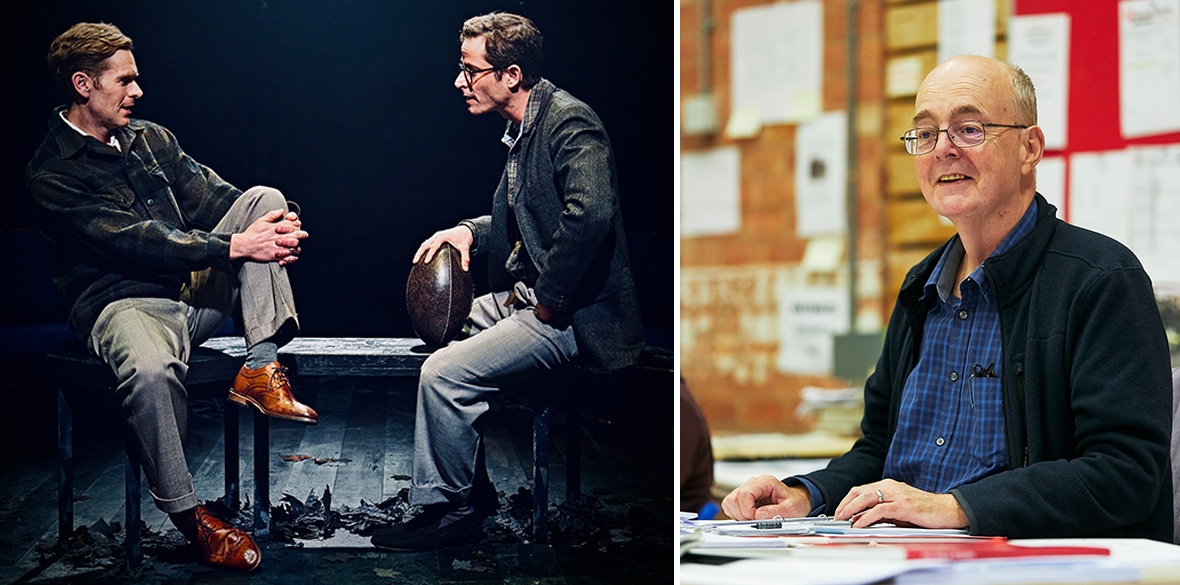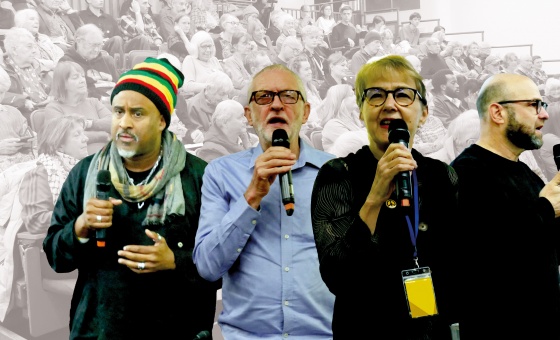This is the last article you can read this month
You can read more article this month
You can read more articles this month
Sorry your limit is up for this month
Reset on:
Please help support the Morning Star by subscribing here
THE five years since I last spoke to the prolific playwright David Edgar have been a wild ride crammed with war, rising right-wing populism and a global pandemic.
As I sit down to talk to him about two new plays that he currently has in performance, The New Real at the RSC and Here in America at the Orange Tree, there is much to discuss and, as he admits, “it’s difficult to be optimistic.”
The RSC’s production, his tenth at the theatre over almost 50 years, centres on US political consultants “spreading their dark arts across the planet” — something Edgar is very keen to highlight. So much so that he has also co-authored a book on the subject with Jon Bloomfield titled The Little Black Book of the Populist Right.
In both texts he is seeking to interrogate what he sees as a “new political fault line combining seemingly left-wing economic policy with increasingly right-wing social and cultural policies.”
The two rival election strategists, played by Martina Laird and Lloyd Owen, end up “learning more than they teach” in an unnamed early 2000’s eastern European country. Edgar sees the post-Soviet period in eastern Europe as the Petri dish for such politics which have “since spread westward across Europe” and, of course, to the US itself.
How do we stop that spread?
Closer to home in the case of the Starmer’s government, Edgar is clear that “with that level of majority it needs to take the opportunity to be bolder and certainly not introduce things that weren’t even in the manifesto like scrapping the winter fuel payment.” He goes on to criticise the continuation of the two-child benefit cap as “a missed opportunity to signal that Labour was different from its predecessor.”
“What was undoubted about the 2024 election was that the Conservatives did really, really badly and it was a profoundly damning verdict on what was a nationalist populist government.”
How about in Europe, particularly France, where the success of the left has been stymied by Emmanuel Macron and the French Establishment? Edgar feels that the “cordon sanitaire [against far-right parties] has broken down.”
“Across Europe we’re seeing the choices that the Conservative right and the centre left are facing when the far right does well. The very first place for that to happen was in Austria in the early years of the century when the Conservatives accepted the Freedom Party as a coalition partner. That is now happening right across Europe. It’s a deeply worrying development and it needs to be opposed.”
Suppression of left-wing power is at the heart of Edgar’s current Orange Tree production Here In America which analyses the McCarthyite era through the eyes of some of its dramatic figureheads — Elia Kazan, Arthur Miller and Marilyn Monroe.
With the Royal Exchange in Manchester recently cancelling a production of A Midsummer Night’s Dream, one of its calendar highlights, due largely to the reported inclusion of the words “Free Palestine” in a rap segment of the show, I put it to him that we are perhaps in the midst of a similar period of censorship. He’s not quite so sure.
Despite it being a “deeply regrettable situation,” he feels it is more of a structural issue within the model of the theatre, where they have replaced the artistic director with an executive one — a move being replicated elsewhere reflecting increasingly corporate values in some of the country’s biggest theatres.
More widely however, Edgar is clear that British society is still heavily weighted to the wealthy and powerful, and perhaps going backwards in that respect. When asked about the draconian sentences recently handed down to climate activists, he’s unequivocal: “They are a significant upping of restraint on protest at a time when, so far, the perpetrators of the persecution of sub-postmasters and those responsible for the Grenfell disaster seem to be getting away scot-free. It’s a very skewed criminal justice system in terms of its values.”
Kazan and Miller were also punished for their political beliefs, with the film director becoming a willing informant to the House Unamerican Activities Committee.
Miller, who Edgar knew in his later life, never joined the Communist Party but did “support the right of the party to exist and protested against the excesses of McCarthyism, remaining on the left for the rest of his life.”
Edgar recalls a speech given by Miller to students protesting against the Vietnam war in which he encouraged them to never forget the feeling they were feeling at that moment. It was a moment in which Miller was rediscovering “his own excitement about the thought of a better world.”
Edgar still retains that desire too but fittingly for the times, both his latest plays are warnings against an even bleaker future.
“If social democratic parties can retain some of their audacity and drive, then the march towards national populism can be stopped,” he states as we round off a wide-ranging discussion.
Something tells me it might require a little more than that, but it would certainly be a good place to start.
Here in America runs at the Orange Tree, Richmond, until October 19. Box office: (020) 8940-3633, orangetreetheatre.co.uk.
The New Real runs at The Other Place, Stratford upon Avon, until November 2. Box office: 01789 331-111, rsc.org.uk.












